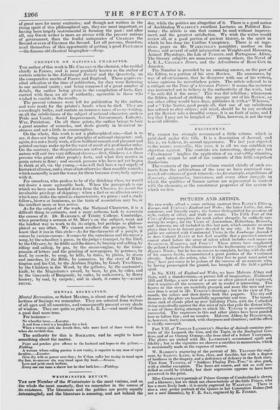CHENEVIX ON NATIONAL CHARACTER.
THE author of this work is Mr. CHENEVIX the chemist, who resided chiefly in France, and is most popularly known as the author of certain articles in the Edinburgh Review and the Quarterly, on the comparative merits of France and England. These papers ex- cited attention at the time of publication, for they were flattering to our national. vanity; and being composed of a great number of details, the author being given to the compilation of facts, they carried with them an air of authority, agreeable to those who wished to confide in the results.
The present volumes were left for publication by the author, and were ready for the printer's hands when lie died. They are exceedingly bulky, and contain an immense mass of essay-writing, on all the subdivisions of the subject of national character, such as Pride and Vanity, Social Improvement, Government, Industry, War, Patriotism. On all these points, the author brings to bear a great number of remarks, and deals greatly in historical in- stances and not a little in commonplace.
On the whole, this work is not a philosophical one,—that is to say, it does not bring out the principles of national character : and, again, it is not a lively work, where brilliant remark and pleasant and pointed sayings make up for the want of merit of a profounder order. On the contrary, the dissertations are rather prosy, and from their nature will suit two very different classes,—first, thinkers, i.e. those persons who grind other people's facts, and what they receive in grain return in flour; and second, persons who have not yet begun to think at all, viz, the young,—who will find here a vast supply of historical allusion, and a store of not otherwise than sensible remark; which assuredly is not the worse for them because everybody agrees with it.
For ourselves, who profess to be of the thinking class, we would not desire a more agreeable book. When the paragraph is one which we have seen handed down from the Classics, we assert the invaluable privilege of skipping : when a fact or an allusion occurs which may strike the mind as characteristic, we pause ; and a study follows, brown or luminous, as the train of association may be, or the intellect more or less active.
As for the subject of the work, the National Character, it is a - difficult thing to estimate, and a more arduous task to ascertain the causes of it. Dr. RAMSDEN, of Trinity College, Cambridge, when preaching a sermon at St. Mary's on the subject, went not the briefest way to work to fix its origin, but perhaps as philoso- phical as any other. We cannot recollect the passage, but we know that it ran in this style—As for the character of a people, it comes by various causes : it comes by the catechism and the nurse's song, by the schoolboy's game, by the judge's trumpet, by the Iliad, by the Odyssey, by he fiddle and the dance, by buying and selling, by riding and sailing, by gas, by the steam-engine, by the trail's- mission of letters and the printing of newspapers, by potatoes, by beef, by crowdy, by soup, by hills, by dales, by plains, by rivers and marshes, by the Bible, by romances, by the story of Whit- tington and his Cat, by the Arabian Nights, by Goody Two Shoes, by the Children in the Wood, by the gallows, by the anatomist's knife, by the Magistrate's award, by • beer, by gin, by cider, and by the vineyards of Burgundy, by corks, by corkscrews, by fleecy hosiery, by coal, by carpets; and in short, it comes by—EVERY


















































 Previous page
Previous page